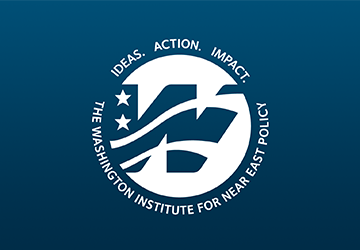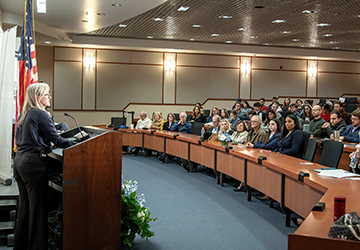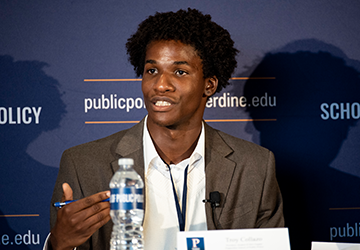Master of Middle East Policy Studies
Professional Training at the Intersection of Middle East Politics and US National Security
The Pepperdine Master of Middle East Policy Studies (MMEPS) is the product of a unique partnership between Pepperdine’s School of Public Policy and The Washington Institute for Near East Policy, America’s leading policy research institution focusing exclusively on the Middle East. Unlike any program in the nation, this two-year, in-person program blends study of the modern Middle East and coursework on U.S. policy toward the region with practical skills training designed to equip the early-career professional for success in diplomacy, intelligence, research, development, advocacy, journalism, business or further academic studies.
Applications for Fall 2026 are closed. Stay tuned for Fall 2027 information.
Important Update: At this time, due to State Department approvals required for F1 international students, we're only able to admit domestic students, A-1 Visa holders, and registered asylees.
Program Features
- Coursework blend of Middle East politics, history and economics; U.S. foreign policy and national security; and professional skills-building in effective decision-making, analysis, policy formation, and execution
- Extensive educational and career development resources through the Washington Institute for Near East Policy
- Expert faculty teaching from accomplished scholars, experienced policy practitioners, and acclaimed regional experts
- Learn and study in the nation's capital: the Pepperdine location is three blocks from the White House, across the street from George Washington University, and close to Georgetown shopping, dining, and entertainment
- A multi-country, Middle East policy study tour organized and led by the scholars and experts of The Washington Institute
- Strategic leadership degree designed to reflect the Pepperdine mission of equipping students for lives of purpose, service, and leadership
Quick Facts
Format: In Person, Daytime and some Evening Classes
Start: Fall Cohorts
Cohort Size: 25 Students
Location: Washington, DC
Length: 4 terms; 2 years
Units: 45
Full-Tuition Scholarships
To encourage the best-and-brightest applicants, irrespective of financial need, the program will extend full-tuition scholarships to all students.
Region-Specific Curriculum
A curriculum that sits at the intersection of Middle Eastern studies, U.S. foreign policy and national security, and professional skills-building, incorporating a balanced coursework of history, politics and economics with thematic focus on such issues as grand strategy, intelligence and counter-terrorism.
Professional Development
Designed specifically to equip the early-career professional with the knowledge, experience and skills to excel in diplomacy, intelligence, research, development, advocacy, journalism or business.
Unique Think Tank/Academic Partnership
Designed in partnership with the nonpartisan Washington Institute for Near East Policy, America's leading think tank solely focused on US Middle East policy. Institute alumni have served in senior government positions in every administration, Republican and Democratic, since its founding, forty years ago.
Take the Next Step
Reach out to us to learn more about Pepperdine's Master of Middle East Policy Studies program.
Start Your Application
Make a significant impact in the world through a cross-sector degree. Start your public leadership journey.
Get In Touch
Fill out the Request Information form to learn about the opportunities that await you and get in contact with an SPP staff member.
From the Partners

Robert Satloff
Segal Executive Director, The Washington Institute for Near East Policy

Pete Peterson
Braun Family Dean, Pepperdine School of Public Policy
Admissions
Application Requirements
The admissions criteria for the MMEPS consists of the following elements:
- Completed application for admission
- Bachelor's degree with an acceptable grade point average from a regionally- accredited college or university
- Minimum GPA of 3.0 in a relevant undergraduate degree program. These include, but are not limited to: Political Science, International Studies, Region-Specific Studies (Arabic; Middle East; Islamic studies), National Security Studies, History, or Economics and Policy Studies
- Official undergraduate transcripts
- One academic letter of recommendation
- A brief essay (500 words) outlining options for resolving a US policy challenge in the Middle East
- A personal statement
- Current resume or curriculum vitae
*No standardized test scores are required
Full-Tuition Scholarship for Fall 2026 Cohort
Through generous donor support, Pepperdine University's School of Public Policy and the Washington Institute for Near East Policy will provide full-tuition scholarships, irrespective of need, to support two years of enrollment for the next cohort in the Master of Middle East Policy Studies program. This scholarship will include the cost of a Middle East policy study tour organized and led by experts from The Washington Institute as well as the cost of professional language training to help students pass a language proficiency examination in a Middle East language (Arabic, Hebrew, Kurdish, Persian or Turkish) before they graduate.
Fall 2027 Deadlines
The Fall 2026 application deadline has now passed. Stay tuned for Fall 2027 application information and deadlines.
Esteemed Faculty
- Robert Kaufman: Dockson Professor of Public Policy, Pepperdine School of Public Policy. PhD, Columbia University. A 30+ year career in academia with stints at the Naval War College and Air Force War College. Expert on American grand strategy.
- Patrick Clawson: Morningstar Senior Fellow, Washington Institute. PhD, New School for Social Research. Former senior economist, World Bank/IMF.
- Martin Kramer: Walter P. Stern Fellow, Washington Institute. PhD, Princeton University. Founding president Shalem College, and visiting professor at University of Chicago, Cornell, Harvard. Author of eight books on the region.
- Devorah Margolin: Blumenstein-Rosenbloom Senior Fellow, Washington Institute. PhD, King's College London. Former director of strategic initiatives at the program on extremism at The George Washington University. Project manager for the ISIS files digital repository.
- Ambassador Dennis Ross: William Davidson Distinguished Fellow, Washington Institute. PhD, UCLA. Advisor to Presidents Reagan, GHW Bush, Clinton and Obama, including service as Special Envoy for Middle East Peace. Author of definitive history of Arab-Israel peace process.
- Robert Satloff: More than 30 years leading The Washington Institute as Segal Executive Director. PhD, Oxford. Expert on Arab and Islamic politics and U.S. Middle East policy. Author of books on U.S. public diplomacy, Jordanian politics and the history of the Holocaust in Arab lands.
- Dana Stroul: Director of research, Washington Institute. MS, Georgetown University. Former deputy assistant secretary of defense for the Middle East, and former senior professional staff member on the Senate Foreign Relations Committee.
- Michael Singh: Managing director, The Washington Institute. MBA, Harvard. Former foreign service officer, executive assistant to Secretaries of State Colin Powell and Condoleezza Rice and senior director for Middle East affairs, National Security Council.
- Hanin Ghaddar: Friedmann Senior Fellow at The Washington Institute, former managing editor of Now! Lebanon English-language news site and expert on Hezbollah and broader Shiite politics in the Arab world. MA, American University of Beirut.
And many more…
Curriculum
The curriculum for the Master of Middle East Policy Studies (MMEPS) degree is built
around "three pillars," and balances core coursework with electives totaling 45 units
for degree completion. The MMEPS begins with a semester fully dedicated to core coursework,
and then proceeds to weave in elective options throughout the remaining four semesters.
The unit structure for the curriculum is designed to provide both focus on core courses,
but also flexibility to add electives, including select "short course" intensives.
Three Pillars Foundation:
1. Understanding the Middle East Today
2. Understanding US Foreign Policy/US Middle East Policy
3. Understanding the Professional Toolkit: Skills in Policy-Writing, Intelligence Analysis, a Military Strategy.
Why Pepperdine

About the Washington Institute for Near East Policy
Founded forty years ago, The Washington Institute is one of America’s leading research institutions focused exclusively on Middle East politics and U.S. policy toward the region. Over the years, the Institute has earned accolades from leaders, officials and scholars across the political spectrum for its emphasis on evidence-based research and non-partisan policy recommendations to advance U.S. interests in security and peace in the Middle East. With a staff of U.S. and international experts, analysts, and policy practitioners, the Institute has provided creative idea and a critical “second opinion” to administrations of both parties on all issues on the U.S. policy agenda in the region, from promoting Arab-Israeli peace and integration to countering terrorism and extremism to preventing the proliferation of weapons of mass destruction.
A Premier Faith-Based School
Pepperdine has always had a singular mission: to strengthen students for lives of purpose, service, and leadership in a learning environment where academic excellence is rooted in Christian faith and values. As one of the few MPP degree programs based at a Christian university, we incorporate a unique approach to human, moral, and ethical dimensions of policy challenges. The importance of faith in preparing ethical leaders and the foundational significance of religious liberty are integral to the program's teachings. We empower students from all faith backgrounds to transform into the best possible version of themselves for meaningful work and purposeful lives.

Top-Ranked
#1 Consistently Listed as a Top Choice for Graduate MPP Programs (National Center for Education Statistics)
#1 MPP program based at a Christian university (US News & World Report)
#9 Best-Value in the West/SW (Kiplinger)
#10 in the West for Policy Programs (US News & World Report)

Student Experience for a Lifetime of Success
Explore exciting opportunities and engage the community through institutes, student organizations, extracurriculars, and research opportunities.
Accreditation Statement
The Pepperdine Master of Middle East Policy Studies program is accredited by the Western Association of Schools and Colleges Senior College and University Commission (WSCUC) and approved by the Washington DC Higher Education Licensure Commission (HELC).
Contact Us

Nathan Peterson
Assistant Director of Student Services
Office of Student Services School of Public Policy
Learn More
Request information about Pepperdine's Master of Public Policy to learn more.
Related Programs
You may also be interested in the following programs:

